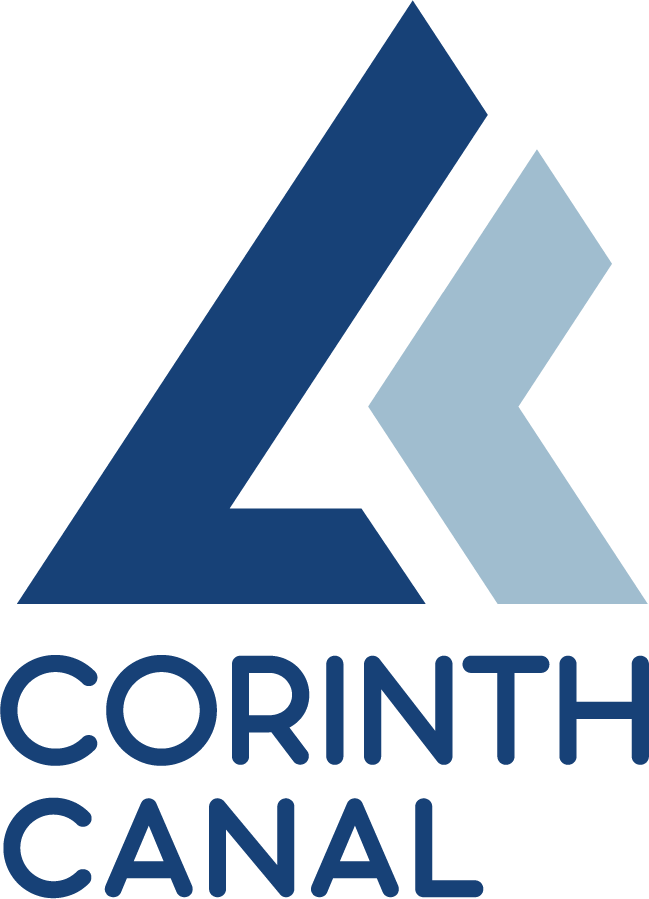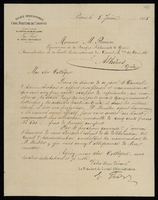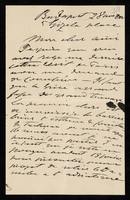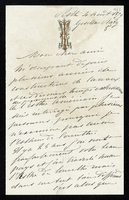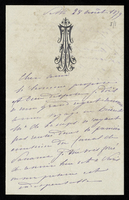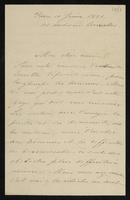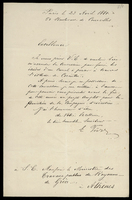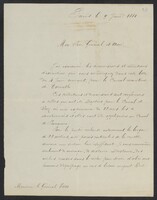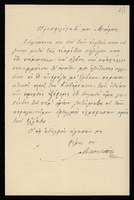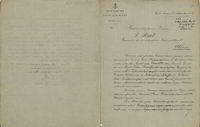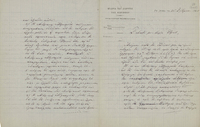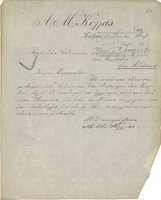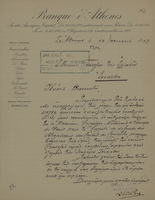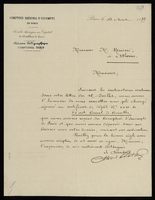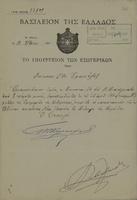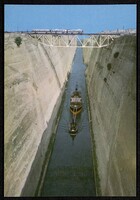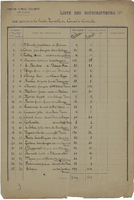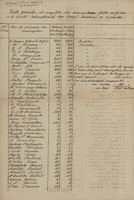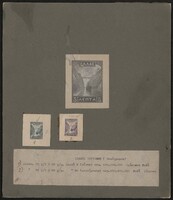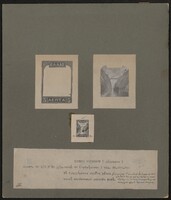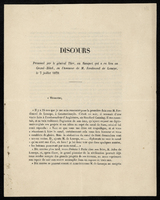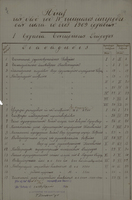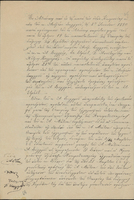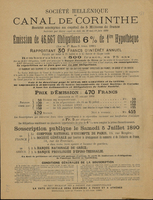-
Letter from Turr, chairman of the Board of Directors of the Corinth Canal International Company, to the governor of the National Bank and the company's advisor, Marco Renieri, who, in the absence of the president, assumed its representation vis-à-vis the Greek government and local authorities.
-
Turr mentions in his letter that the work on the Isthmus must be done first, he need to stay in Hungary until June 18 for his project to connect the Danube with the Adriatic, and that he will come to Athens accompanied by one of his engineers who participated in the Panama Canal expedition.
-
Turr refers to his acquaintance with Negri on his first trip to Greece, 5 years earlier, who intends to accompany Turr to Athens, as part of the trip he plans to make to Greece in early September with his wife and 14-year-old his son. On occasion, he will visit Corinth and consider the possibility of engaging in the construction of the canal, as he has lately been exclusively concerned with the Panama Canal.
-
General Turr is very sorry to announce to Renieri the postponement of his planned trip to the East/Greece in hopes of making it next year.
-
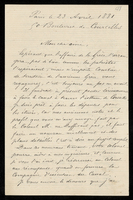
In the introduction of the letter, Turr expresses the hope that Greece will recover at least some of the territories of old Greece (the letter was written a few days after the agreement in Constantinople for the definition of new Greek-Turkish borders in Epirus and Thessaly). He urges become the Canal project. He intends to undertake the expenses of the new studies as his old notes are not sufficient and a more detailed and complete design is required this time. The Greek Colonel could assist his engineers and be rewarded when the Company that will undertake the project. He asks for Renieris' help to mediate so that the Government grants him the temporary right to undertake the project so that he himself can come to Greece to prepare a study and organize the Company. He gives the six points that he considers should accompany the temporary license (favorable attitude of the Government to open a canal in the Isthmus of Corinth, designation of General Turr as responsible for the technical study of the project with the obligation to present it before the end of 1881, establishment of the Company in 1882 and completion within the same year of the preparation for the construction, determination by the Government of all the benefits that the Company will receive with the definitive undertaking of the project, securing all the necessary conditions so that they can sail the Isthmus and the largest ships, delivery from the Government of all lands for construction purposes, including those belonging to private individuals and for which expropriation is required).
-
He expresses his deep appreciation and personal thanks to Renieri for his assistance, adding that the Greek state owes him thanks. He states that inertia and bureaucracy are the biggest obstacles to overcome. He criticizes the articles of the convention as they do not contribute to speeding up the procedures. Considering that the interests of the Company and the Greek Government are identical, he urges him to persuade the Ministers not to engage in unnecessary difficulties.
-
Turr requests that he be officially assigned the study of Isthmus so that he can present by the end of the same year a complete plan and designate the Company that will undertake the execution of the project.
-
Lesseps' reply to Turr's letter of June 4, 1881, five days later. Lesseps invokes his own experience of 12 years with the Suez Canal and the recent undertaking of the project in Panama. The correspondence of the two men confirms the comparison of the planning of the Corinth canal with the data of the other two in Egypt and America.
-
Manitakis wishes Marcos Renieris on his birthday. He mentions that he is attaching his own plan in which he expresses "in a way that is caring towards the Government, the idea you (Renieris) expressed the day before yesterday, that is, if the border issue is not resolved, the eyes of the capitalists will turn to Greece". The plan to which Manitakis refers has not been located.
-
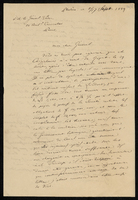
Renieris informs Turr that he has informed Corgiolanios (who assured him that he will receive a corresponding information letter from Turr himself) that they are looking for a loan from an English house in order to pay off the company's liabilities, buy back shares and complete the projects. All of the above, however, on the condition that the Greek government will guarantee the completion of the project with the agreed amount of the loan, which the engineers, after an on-site visit, have found sufficient. Renieris would undertake to ask Trikoupis if he would be willing to provide a state guarantee for the loan. Renieris visited Trikoupis, who refused to guarantee, considering that it is not a matter of the Government but of the company itself to find the money required to complete the work. He intends to provide moral support to the entire effort. Renieris believes that if the funds are found from the company, Trikoupis will approve the extension of the required time to complete the project, but that's it. In the unfortunate event that the funds are not found and they are forced to turn to the Government, Renieris believes that the Government will completely undertake the project on their behalf.
-
Letter from the Austrian shipping company Lloyd to the governor of the National Bank, Stefano Streit, regarding the works that it proposed to make the use of the canal safe.
-
Letter from the Corinth Canal Company to the governor of the National Bank on Lloyd's proposals: The general management of the canal agrees to a discount on the tolls for Lloyd's steamers, but does not agree to give them priority over the rest companies. He also requests that the improvement works not be carried out by Lloyd, but, based on the foreign plans, by the canal company "as it will undoubtedly find in Greece the suitable engineers and contractors without incurring the expense of the Austrian staff."
-
A. M. Kolla's letter to the governor of the National Bank of Greece in which he declares, as the owner of twenty shares of the Corinth Canal Company, that he wishes to subscribe to the new one at the specified ratio (1 to 4 of the old ones) by paying 25 drachmas for each one.
-
Letter from the general manager of the Bank of Athens Matsa to the governor of the National Bank. In it he states that he accepts the terms of the agreement between the three banks (National, Athens and Comptoir National d'Escompte de Paris) for the acquisition of the Corinth Canal. It also refers to the participation in the negotiations of the "Committee for the defense of the interests of the bondholders of the Corinth Canal Company" ("Comite de defense des obligataires de la Societe Helle nique du Canal de Corinthe") which operated in Paris.
-
Letter from the Comptoir National d'Escompte de Paris to the governor of the National Bank, M. Renieri, regarding 50 shares of the Corinth Canal Company.
-
Letter from the Minister of the Interior N. Kalogeropoulos to the management of the National Bank, announcing the approval of the statutes of the New Corinth Canal Company.
-
Isthmus of Corinth Postcard
-
List of the Comptoir National d'Escompte de Paris of the registered shareholders of the New Corinth Canal Company.
-
Detailed list of the shareholders of the Corinth Canal International Company in Greece. The number of shares they subscribed for and the number of shares ultimately awarded to them are recorded. National Bank is listed first as the owner of 990 shares with the note "founder". They are followed by the top executives of M. Renieri, G. A. Vassiliou, Kechagia with 60 shares each, also all with the note "founder". In the following pages it is stated that all three took 18 more shares each. The last page shows the total number of shares allocated in Greece, 2,838 therefore National Bank owned more than 1/3.
-
Collage of postage stamps depicting the Isthmus of Corinth Canal.
-
Collage of postage stamps depicting the Isthmus of Corinth Canal.
-
General Turr describes their first meeting (1854), Lesseps' vision and passion for the opening of the Suez Canal, the completion of the project in a relatively short time despite the ominous predictions of some influential people of the time, such as Stratford Canning. He expresses his admiration for Lesseps and describes his contribution to the work of opening the Panama Canal, firstly as advice and encouragement and secondly as project manager.
-
Chart of work carried out in 1909 by the maintenance department of the Corinth Canal, signed on the reverse by the engineer in charge on 20 February 1910.
-
Minutes of the meeting of June 3, 1890 in Athens of the members of the Board of Directors of the Corinth Canal Company. At the meeting, Andreas Syngros was unanimously elected president of the Council and Stefanos Streit, deputy governor of the National Bank, vice president. At the same meeting, the delivery of the Isthmus by the liquidator of the previous company and the contracts with A. Matsa's contractor company were discussed.
-
Announcement of the loan of the Corinth Canal Company: issue of 46,667 bonds at a price of 470 francs and an annual interest of 6%, that is, 30 francs. Accompanied by an open letter dated 23 June 1890 from Adalbert Philis, to shareholders and all interested parties, as well as a map of the area and a plan of the project.
